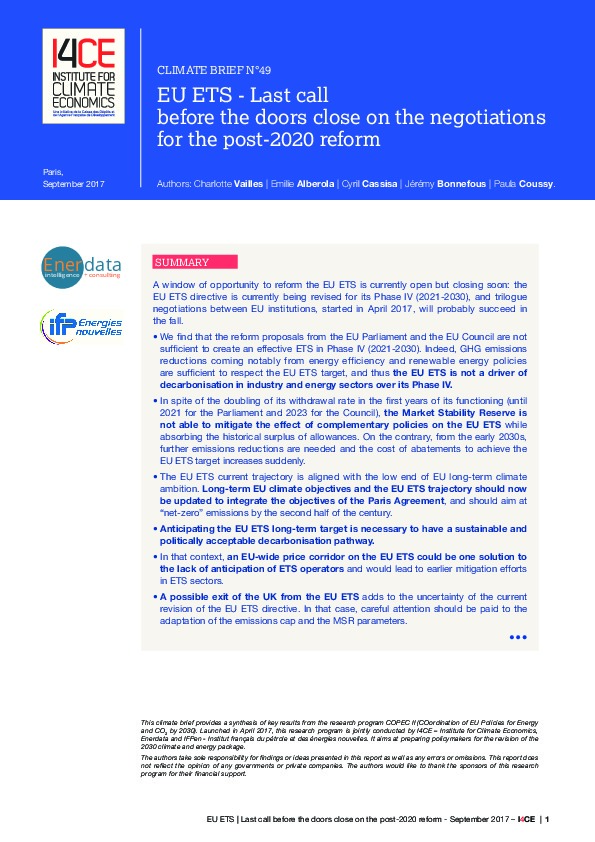EU ETS – Last call before the doors close on the negotiations for the post-2020 reform
I4CE, Enerdata and IFPEN published a policy brief on the reform of the EU ETS for the post-2020 period. Indeed, a window of opportunity to reform the EU ETS is currently open but is closing soon: the EU ETS directive is currently being revised for its Phase IV (2021-2030), and trilogue negotiations between EU institutions, started in April 2017, will probably succeed in the fall.
This policy brief was produced within the framework of the research program COPEC II and provides a synthesis of key results from a report that will be published later in September 2017.
Key messages :
- We find that the reform proposals from the EU Parliament and the EU Council are not sufficient to create an effective ETS in Phase IV (2021-2030). Indeed, GHG emissions reductions coming notably from energy efficiency and renewable energy policies are sufficient to respect the EU ETS target, and thus the EU ETS is not a driver of decarbonisation in industry and energy sectors over its Phase IV.
- The EU ETS current trajectory is aligned with the low end of EU long-term climate ambition. Long-term EU climate objectives and the EU ETS trajectory should now be updated to integrate the objectives of the Paris Agreement, and should aim at “net-zero” emissions by the second half of the century.
- Anticipating the EU ETS long-term target is necessary to have a sustainable and politically acceptable decarbonisation pathway.
- In that context, an EU-wide price corridor on the EU ETS could be one solution to the lack of anticipation of ETS operators and would lead to earlier mitigation efforts in ETS sectors.
- A possible exit of the UK from the EU ETS adds to the uncertainty of the current revision of the EU ETS directive. In that case, careful attention should be paid to the adaptation of the emissions cap and the MSR parameters.
- Finally, the framework for free allocation to prevent carbon leakage risks in industrial sectors is a focal point in the negotiations on the EU ETS reform.We find that the positions of the Council and the Parliament on the EU ETS reform will probably result in a Cross-Sectoral Correction Factor (CSCF) triggered at the end of Phase IV, under conservative assumptions for benchmark decrease rates in major sectors covered by the EU ETS (refinery, cement, aluminum, steel)
- Unless an unexpected proposal comes out of the trilogue negotiation, the revised EU ETS directive will not be sufficient to deal with overlapping policies. The negotiations on other pieces of the climate and energy framework, and in particular on the proposed Governance Regulation, thus appear as an opportunity to create a consistent policy mix and manage the interactions between the different policy instruments.

